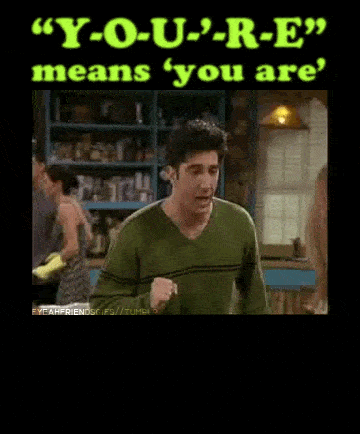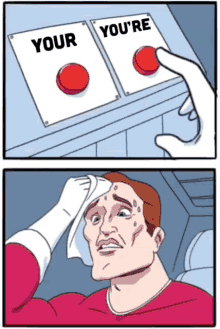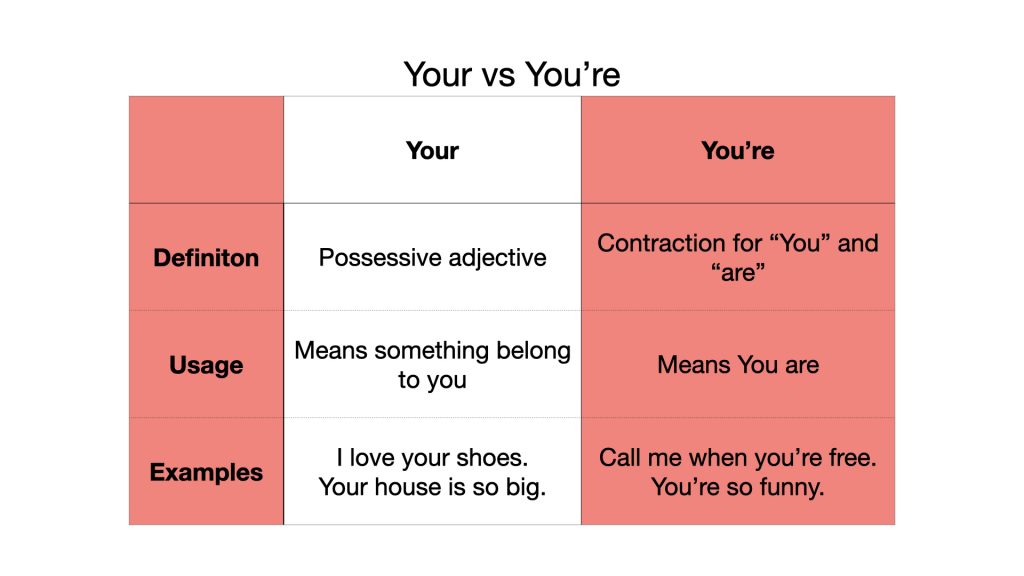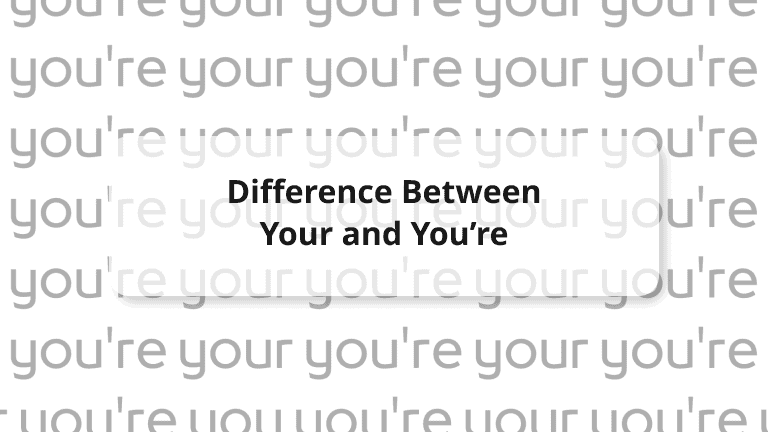To you’re or not to your, that is the question. What is the difference between your and you’re? It might be easy to get away with “your and you’re” during conversational English but when it comes down to writing and grammar these two words can cause a lot of strife, especially for people starting beginner English lessons.
To seal the deal there are a plethora of examples for you to cement these concepts and a short quiz that you are welcome to try. This will help you practice and comprehend your new knowledge. This may sound daunting but like riding a bicycle, once you learn how to do it, you will never forget how to do that skill confidently. So let us hope on and take off.

Your vs You’re
Difference between your and you’re? Your is the possessive form of the pronoun you, meaning that the word your is always followed by a name that belongs to or is associated with you; while “You’re” is a contraction of the phrase you are.
What is the Difference Between Your and You’re?
Your is the possessive form of the pronoun you. It is used to describe something as belonging to you. “Your” is always followed by a noun. “Your” is “considered a possessive determiner. Other possessive determiners are “my,” “your,” “his,” “her,” “its,” “our,” and “their.”
You’re is a contraction of the words “you” and “are”. When you see words with an apostrophe like this, you can be sure that it is a contraction; the apostrophe stands for a missing letter (or letters) in the word. The apostrophe in a contraction represents missing letters, in this case, the missing “a”.

Confusion Between Your and You’re
A big reason why people get these confused is the relationship of apostrophes with possession, this is usually because of the common addition of ‘s to a person’s name to show possession, as in Harry’s house or Nicole’s car.
This may sound frivolous but English grammar is important because it dictates how words are used in sentences. There are many different rules and exceptions for sentence structure, word usage, and punctuation but what makes the language work?
So it is important to know the grammar of the language you’re speaking so that you can communicate effectively with others. So although it may seem trivial English grammar can be quite interesting as it has many quirks and intriguing rules.
How to remember the right one: Your and You’re?
An easy way to remember this is if you can replace the word with “you are,” you should select “you’re“. Otherwise, you should only choose “your“.
An easy way to remember this is by using two checks to keep yourself free from errors while using these two words.
The first check is to see if you are not sure that “your” is the correct word for your sentence, look to see if a noun is anywhere around it. “your” is an adjective and therefore will be modifying a noun nearby. If there is no adjective around, you might want to use “you’re.”
The second check is more technical but very easy and 100 percent accurate. No matter which word you think should be placed into the sentence, substitute it with “you are” and see if the sentence still makes sense. If it still makes sense, use “you’re.” If it does not, use “your.”

Your and You’re” Examples
Your
- “You forgot your scarf at the store.”
“You” own the scarf in this situation. With scarf being the noun, it lets us know to whom the noun belongs and comes before a noun in the sentence.
- “I appreciate your help.”
This is a possessive adjective which is an adjective that is used to show ownership. It lets us know to whom the noun belongs, and it comes before a noun in the sentence.
- “I love your cooking.”
This “your” is used in a Sentence prior to a gerund. A gerund may sound confusing but to put it simply, a gerund is derived from a verb (ending in -ing) but functions as a noun. So in this example “cooking” is a noun as it ends in -ing and “your” shows the possession of this noun.
You’re
- “Have you decided where you’re going for holiday?”
This should be easier to grasp. This example is a question and as we’ve discussed “you’re” is a contraction so if we remove the contraction “you’re” would translate to “you are” which in this case makes sense with the sentence.
- “You’re going to be late for English class!”
As discussed above this sentence would read the same way if “you are” were replaced with “ you’re”.
- “I can’t believe you’re going to Spain!”
Verbs or action words, usually (but not always) come after “you’re” in a sentence because “you’re” describes something you are doing. As we can see you can replace “you’re” with “you are” and the sentence will still make complete sense.

Is It Your or You’re?
The difference between “your and you’re” isn’t the only is not the only culprit that trips people up. There are thousands of homophones in English, including many commonly used words, and they’re often confusing, even for native speakers. Although they might sound the same there are words with multiple meanings. These words are called homophones and are more common in everyday English than you might think.
Homophones (they’re also called “homonyms.” which means “same name,”) are pairs, or even trios, of words that sound the same but have different spellings and different meanings. They are often a cause of problems for English speakers and are a frequent source of questions for those who learn English online, even when using the best English learning apps.
When spell-checking documents incorrect word selection is often not found until it is too late. This adds another level of difficulty for those just learning English as the incorrect usage is not as obvious to correct.
So, avoid ambiguity. This is a little trickier, but keep in mind that you have to make it clear which meaning you intend. Make sure that the context leaves no doubt about your meaning, and if necessary add a sentence or so of clarification. (In creative writing, this rule is a little more relaxed, but it’s very important in essays.)
As we said homophones are more common than you think for example “there vs their vs they’re” or “two, too and to.”
Here is a list of other Common Homophones:
- brake/break: When teaching my daughter how to drive, I told her if she didn’t hit the brake in time she would break the car’s side mirror.
- cent/scent: I won’t spend one cent on a bottle of perfume until I know that I love the scent.
- flour/flower: To bake a flower-shaped cake, you’ll need some flour.
- hour/our: We have one hour before our appointment with the real estate agent.
- steal/steel: Someone who decides to steal a car has committed a crime, but auto parts are made of steel.
Is You’re or Your Correct?
Below is a short quiz you can try which will help you practice using “your” and “you’re”. Simply fill in either “your” or “you’re” and check which one is correct at the end of this article:
When is _____ brother coming home from work?
your
I think they both go to _____ school.
your
When _____ feeling sick, it is better to stay home for the day.
you’re
_____ making me laugh with_____ funny jokes.
You’re, your
Are you sure you know what _____ doing?
you’re
_____ impossible to beat at chess.
You’re
Is that _____ new car that _____ talking about?
your, you’re

Your is the possessive form of the pronoun you, meaning that the word your is always followed by a name that belongs to or is associated with you; while “You’re” is a contraction of the phrase you are.
The “your” is an adjective and therefore will be modifying a noun nearby. If there is no adjective around, you might want to use “you’re.”
You’re on the right track to improving Your English
Now that we’ve established what homophones are, it’s understandable why the difference between “your” and “you’re” or the difference between to or too is such a common mistake even native English speakers make.
To recap The word ‘your’ means “belonging to you” and the word ‘you’re’ is a contraction of “you are”. And the easiest way to remember how to choose the correct word is by seeing if “you are” fits into a sentence and makes sense then ”you’re” is the correct word.
You can now put your new knowledge to the test and see how much you’ve learned. You’re sure to be surprised. If you’d like to learn more you’re going to want to check out AmazingTalker. For your own personalized tutoring needs.
If you attempted the above quiz you can now check your answers and see the results you achieved. Don’t get demoralized if you didn’t get 100 percent, just try again until you get it right:

















